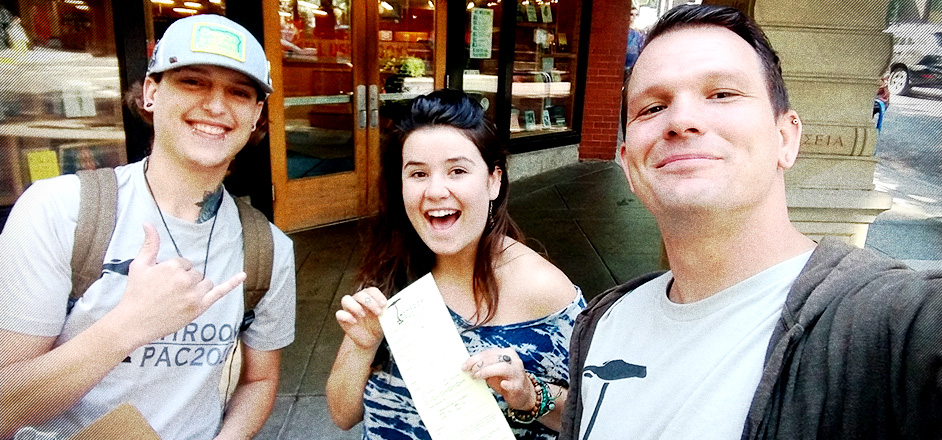Oregon's Chris Abrahamsen, 29, has spent his whole adult life raising money for the environment, to keep glaciers from melting and whales from being harpooned.
It's not an easy job: pounding pavement, asking strangers for money. But his efforts were inspired by nature itself — trees, forests and birds, yes, but also something more colorful.
"Half the staff that I knew on my environmental nonprofit were taking mushrooms on the regular," Abrahamsen said, "because it was helping them connect to the environment."
So, in the past few months, Abrahamsen has narrowed his focus from raising funds for humpbacks and polar bears down to the mushrooms that helped him love nature in the first place.
He and some friends formed a legal entity — ShroomPac. Abrahamsen wants it to be the Greenpeace of mushrooms.
Most days, the four paid staffers and a handful of volunteers pound the sidewalks and knock on strangers' doors, asking for money for shrooms — money they swear they don't immediately spend on shrooms. In just a couple months, ShroomPac says, 1,500 people have donated, mostly in small amounts. They have t-shirts and yard signs.
A decade after medical marijuana took root, psilocybin mushrooms might get their legal moment in the sun … er, their semi-shady spot under a tree. Mushrooms are psychedelic, like LSD and ayahuasca, and eating them feels a bit like taking a big dose of marijuana edibles. Mushrooms, like those drugs, are classified as illegal, even though shrooms grow wild throughout the country.

ShroomPac is the country's second mushroom ground game. They've partnered with Decriminalize Denver, a hundred or so Denverites who are working to gather the 5,000 valid signatures needed to put mushroom decriminalization on the May 2019 city ballot.
Denver's group is all-volunteer. ShroomPac is focused on fundraising, so that signature gatherers for future elections can get paid — which is how most campaigns work.
"ShroomPac is incredible," said Kevin Matthews, head of Decriminalize Denver. "Very professional and extremely well organized."
ShroomPac is especially focused on supporting a bill that might appear on the 2020 statewide Oregon ballot, if they can get the signatures. The Psilocybin Service Initiative of Oregon would decriminalize shrooms for everybody, and allow you to trip with a guide. (Mushrooms can be intense.)
"I've watched psilocybin be a part of so many other movements, behind the scenes," Abrahamsen said. "I never really thought that the mushrooms would be the focus."
It's sometimes an easy sell; shrooms show promise as a mental health treatment. "Every single one of the doors we knock on will have someone who's mentally ill or addicted," Abrahamsen said.
Raising money, ShroomPac's chief financial officer, Bryan Kim, said he has gotten pushback from people who've had bad trips, and don't think others should go through that. But that's rare.
"People generally either don't know about [psilocybin], or else they're educated and really excited to move forward," said Kim.
In many of these legalization campaigns for mushrooms and other psychedelics, just under the surface is a usually unexpressed feeling that there's something deeply skewed with our society's relationship to nature and themselves, and that, rather than fixing any particular policy or changing any one leader, giving people psychedelics, which are a direct experience of nature and themselves, might do the trick. It's an old idea, one Kim and Abrahamsen endorse.
"There's this kind of ancestral history that [psychedelics] are the way that people have figured out the next steps in their lives, and worked out this feeling of being trapped in one way or another," Abrahamsen said. "Humans have always tapped into that. You don't get that from other pharmaceuticals."
Some places, raising money for shrooms is super easy. Abrahamsen spent a recent day on the campus of Reed College, which was attended by Apple's Steve Jobs, a famous LSD-lover. Political science majors were stoked in on the edginess of the mushroom decriminalization effort. "This is way sexier than banning plastic bags," Abrahamsen said. Neuroscience majors were excited about how mushrooms help scientists study the brain. Others were hopeful shrooms could curb opioid addiction.
Beyond its hippie vibe, Reed College is easy to talk into magic mushrooms because mushrooms grow wild on campus. (Mushrooms grow so wild in the Pacific Northwest you'll find them on random walks. Dogs eat them by accident and get stoned. Reed College students generally eat them on purpose.)
At Reed, mushrooms aren't a foreign concept, not distant like whales or glaciers. Abrahamsen could point to nearby patch and say: "We're working on legalizing those ones right there."




Leave a Reply